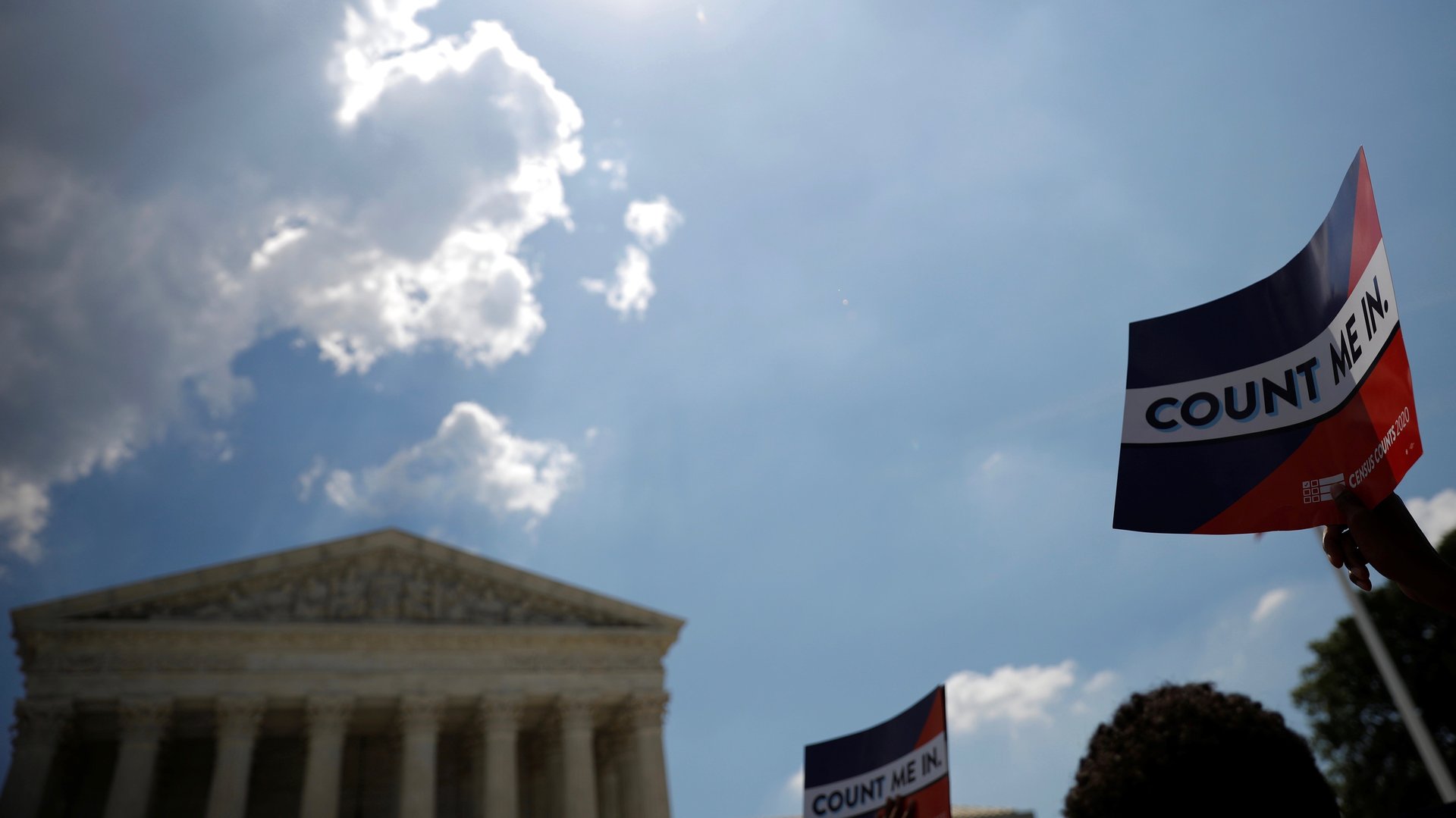What’s driving Trump’s war with the Supreme Court on the census citizenship question
The US Supreme Court ruled last month that the 2020 national census can’t include a question about citizenship because the Trump administration’s stated reason for including it may be a pretext for a more sinister intent, discrimination against minorities.


The US Supreme Court ruled last month that the 2020 national census can’t include a question about citizenship because the Trump administration’s stated reason for including it may be a pretext for a more sinister intent, discrimination against minorities.
“Altogether, the evidence tells a story that does not match the explanation [commerce secretary Wilbur Ross] gave for his decision,” chief justice John Roberts wrote.
Now, the administration is fighting to ask the citizenship question anyway, and in so doing, declaring war on the high court. Donald Trump has made his displeasure well-known since the opinion’s issuance on June 27. Yesterday, he tweeted that “recent strained decisions” by SCOTUS, including one about the “simple” citizenship question, reminded him why appointing justices is such an important job for a president.
Attorney general William Barr, who has switched out the Justice Department’s legal team on the case, told the AP this week that he believes there’s a way to include the question, despite the court’s ruling. He didn’t say how this might be done legally, but Trump has ideas. Last week he suggested he was contemplating an executive order. And government lawyers told a federal district judge in Maryland on July 5 that the DOJ is working on a “new rationale” for the question’s inclusion.
Of course, an executive order and a new rationale can and will be challenged by opponents of the citizenship question. Meanwhile, the government is already mired in proceedings, specifically cases in Maryland and New York federal courts that spawned the SCOTUS ruling. Those case were sent back to the lower courts by the Supreme Court for further proceedings in which US officials must “adequately explain” Ross’s decision.
Why the citizenship question?
The evidence so far suggests that Ross has been intent on asking about citizenship from as soon as he took office in 2017. Last year, he said that adding the question will assist the Justice Department’s civil-rights division in enforcing federal voting rights laws.
Critics say a civil-rights rationale is mere cover. They contend any citizenship question will deter respondents who fear honest answers will be used against them by immigration officials. Including one means that the census’ once-a-decade effort to collect accurate information on who lives where in America won’t yield accurate results. The numbers, regardless of citizenship rates, influence federal funding and congressional representation from certain districts. By including the question on the census, Ross may be trying to skew figures in favor of Republicans and to withhold funds from Democratic strongholds with high immigrant populations.
Newly discovered evidence—introduced by opponents of the citizenship question just weeks before SCOTUS ruled—“goes directly” to the issue of discriminatory intent, the Maryland federal judge said on July 5. Since that issue will remain relevant even if there is a new case about a new justification, the judge denied the government’s request to delay further investigation, saying “time is of the essence.”
Things aren’t going as Barr might hope in the New York case either. A judge on July 9 ruled that the Justice Department can’t just switch its legal team, foiling Barr’s plans to come in with new lawyers and a fresh reason for including the citizenship query so as to get it on the 2020 census surveys in time. (That plan surely has government printers sweating about deadlines—the latest date for starting the process is September).
Beyond the Supreme Court
Trump tweeted about the decision in New York, continuing his attack on the judiciary: “So now the Obama appointed judge on the Census case (Are you a Citizen of the United States?) won’t let the Justice Department use the lawyers that it wants to use. Could this be a first?”
Actually, it’s not a first. Judges commonly disallow or delay substitution of counsel. But perhaps the president’s tweet was simply intended to irk Roberts. The chief justice has responded to previous Trump complaints about “Obama judges” by saying there is no such thing. Judges serve the law, not those who appoint them, Roberts said.
Notably, this time Trump used the phrase “Obama appointed judge,” which is a factual statement rather than an implication that the judiciary operates ideologically (a notion the chief justice finds offensive) and could be a sign the president heard Roberts’ earlier chiding and may have learned something.
In any case, Trump and his appointee, Barr, appear intent on continuing to the fight. Their current strategy seems to be premised on the hope that, under a slightly different set of facts, the legal challenges will be resolved in the government’s favor.
It’s also possible they’re just bluffing, being stubborn and refusing to concede the point because that has worked for the Trump administration before. One example came in the president’s 2017 executive order barring visitors from some Muslim-majority nations, which was revised until it was eventually approved by the high court.
No matter the outcome, the battle resonates beyond the Supreme Court. Trump’s target audience on the citizenship question is not merely the justices but the voters he needs to come out to support his re-election bid next year.